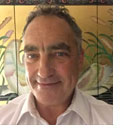Time
6:00 PM – 6:45 PM: Reception; 6:45 PM – 7:45 PM Presentation
Venue
The New York Academy of Medicine, 1216 Fifth Avenue at 103rd Street, New York, NY 10029
Cost
Free, but advance registration is required.
Speaker
Andrew R. Marks, MD, Wu Professor and Chair, Department of Physiology and Cellular Biophysics; Founding Director, Helen and Clyde Wu Center for Molecular Cardiology, Columbia University College of Physicians & Surgeons
Searching for cures for heart failure and cardiac arrhythmias has led Dr. Andrew Marks to explore the structure, function and regulation of the ryanodine receptor, a calcium channel that provides the signal for contraction in heart and skeletal muscles. In this quest he has discovered that stress caused by chronic illnesses, or by inherited mutations, renders the channels leaky to calcium. This calcium leak promotes heart failure and cardiac arrhythmias. He has developed a new class of drugs called Rycals that fix the leak. Rycals improve muscle contraction and prevent arrhythmias. Rycals are now being developed for testing in patients with heart failure, arrhythmias and muscular dystrophies.
 Andrew R. Marks, MD received his undergraduate degree from Amherst College in 1976 and his MD from Harvard Medical School in 1980. Following an internship and residency in internal medicine at the Massachusetts General Hospital (MGH), he was a post-doctoral fellow in molecular genetics at Harvard Medical School, and then a clinical cardiology fellow at the MGH. He is board certified in internal medicine and in cardiology. After serving on the faculties of the Brigham and Women’s Hospital and the Mount Sinai School of Medicine, in 1997 he was recruited to Columbia University College of Physicians & Surgeons as the Founding Director of the Clyde and Helen Wu Center for Molecular Cardiology and Wu Professor of Medicine and Pharmacology. In 2003 Dr. Marks was appointed Chair and Professor of the Physiology and Cellular Biophysics Department at Columbia University.
Andrew R. Marks, MD received his undergraduate degree from Amherst College in 1976 and his MD from Harvard Medical School in 1980. Following an internship and residency in internal medicine at the Massachusetts General Hospital (MGH), he was a post-doctoral fellow in molecular genetics at Harvard Medical School, and then a clinical cardiology fellow at the MGH. He is board certified in internal medicine and in cardiology. After serving on the faculties of the Brigham and Women’s Hospital and the Mount Sinai School of Medicine, in 1997 he was recruited to Columbia University College of Physicians & Surgeons as the Founding Director of the Clyde and Helen Wu Center for Molecular Cardiology and Wu Professor of Medicine and Pharmacology. In 2003 Dr. Marks was appointed Chair and Professor of the Physiology and Cellular Biophysics Department at Columbia University.
Some of his recent honors include election to the Institute of Medicine of the National Academies (2004), the Basic Research Prize from the American Heart Association (2005), election to the American Academy of Arts and Sciences (2005), Doctor of Science Honoris Causa from Amherst College (2009), ASCI Stanley J. Korsmeyer Award (2010), Pasarow Foundation Award for Cardiovascular Research (2011), and the Ellison Medical Foundation Senior Scholar in Aging Award (2011).
Dr. Marks is chair of the SAB of ARMGO Pharma, Inc., a company he founded in 2006 to develop novel therapeutics for heart, muscle and CNS diseases, and is the inventor on eleven U.S. patents for these new treatments. In 2001 he founded the Summer Program for Under-represented Students (SPURS) at Columbia. SPURS provides mentored research training at Columbia University for under-represented and economically disadvantaged students primarily from the New York City public colleges and universities.
Dr. Marks’ interest in fundamental biological processes and translating new understandings into therapies for patients first lead to his identification of the mechanism of action of inhibition of vascular smooth muscle proliferation and migration by the drug rapamycin. This discovery was the basis for the development of the first drug-eluting stent (coated with rapamycin) for treatment of coronary artery disease which substantially reduced the incidence of in-stent restenosis. Over the past 25 years the major focus of his work has been elucidation of the role of intracellular calcium in regulating fundamental cellular processes including cardiac and skeletal muscle contraction, lymphocyte activation, cognitive function, and glucose metabolism. In 2014, Dr. Marks reported the high resolution structure of the mammalian type 1 ryanodine receptor/calcium release channel, which he had cloned and worked on since 1989. He discovered that “leaky” intracellular calcium release channels contribute to heart failure, fatal cardiac arrhythmias, impaired exercise capacity (e.g. in muscular dystrophy), post-traumatic stress disorder (PTSD), Alzheimer’s Disease and diabetes. Dr. Marks discovered a new class of small molecules (Rycals), developed in his laboratory, that target leaky ryanodine receptor channels and effectively treat cardiac arrhythmias, heart failure, muscular dystrophy and prevent stress-induced cognitive dysfunction in preclinical studies.
Event series:
Endowed Lectures and Awards
View our COVID-19 Safety Protocols for attending NYAM public events.